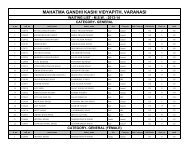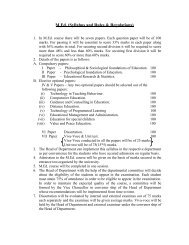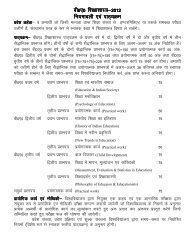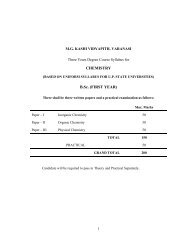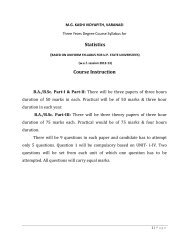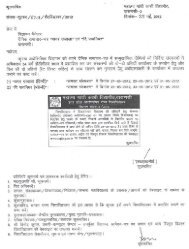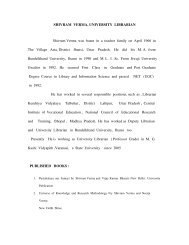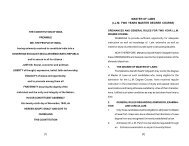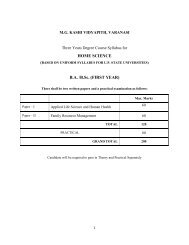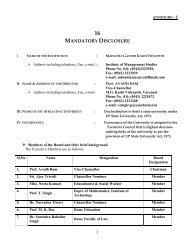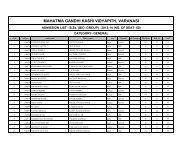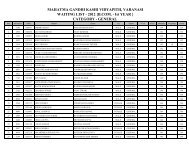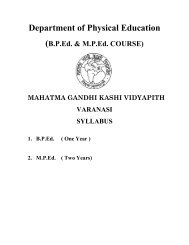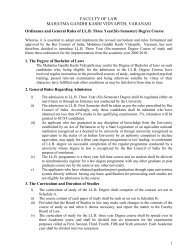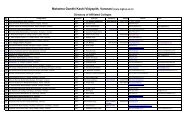ORDINACE And SYLLABUS - Mahatma Gandhi Kashi Vidyapith ...
ORDINACE And SYLLABUS - Mahatma Gandhi Kashi Vidyapith ...
ORDINACE And SYLLABUS - Mahatma Gandhi Kashi Vidyapith ...
You also want an ePaper? Increase the reach of your titles
YUMPU automatically turns print PDFs into web optimized ePapers that Google loves.
<strong>ORDINACE</strong> <strong>And</strong> <strong>SYLLABUS</strong><br />
M. A. (Sustainable Rural Development)<br />
Faculty of Social Work<br />
<strong>Mahatma</strong> <strong>Gandhi</strong> <strong>Kashi</strong> Vidyaptith, Varanasi-2201002<br />
Prospectus<br />
(M. A. Sustainable Rural Development)<br />
<strong>Mahatma</strong> <strong>Gandhi</strong> kasha <strong>Vidyapith</strong>, Varanasi, established in 1921, always<br />
tries its level best to make adjustment with the changing needs of the Country, by<br />
developing and modifying the educational programmers, teaching courses and<br />
other academic activities. On the achievement of Independence, attention had to be<br />
diverted to the building up of the Nation and to solve the Psycho-socio-economic<br />
problems of the people, which had so far been neglected under the alien of rule.<br />
The Governing Council of the <strong>Vidyapith</strong>, among whom counted some of eminent<br />
leaders of the country, decided to establish the Institute of Social Science of 15 th .<br />
August 1947 later named as Department of Social Work. It is the second oldest<br />
Institute in the Country after Tata Institute of Social Sciences, Mumbai, Providing<br />
courses at undergraduate, postgraduate and doctoral level for the training of much<br />
needed professional personnel for the national reconstruction and development,<br />
Since 1980, it has become one of the Faculties of the University.<br />
The Faculty is pioneer in India. Professionally qualified alumni of this<br />
faculty are at the helm of affairs, working at different functional and policy making<br />
levels in the fields of Labour Welfare and Personnel Management; Psychiatric and<br />
Medical Social Work, Family and Child Welfare, Community Development and<br />
Correctional and Criminal Justice Administration. Several in-service training<br />
programmes of Labour Welfare Officers, Health/Educators, Probation Officers,<br />
Family Counselors and NGO Workers, had been organized by the Faculty time to<br />
time. Looking to the growing challenges of criminality, terrorism, conflict, misunderstanding<br />
and social disharmony, innovative strategies and approaches in<br />
policy formulation and programme implementation in respect of law enforcement,<br />
promotion of peace, social harmony, understanding and international friendship;
the Faculty introducing an innovative and field oriented two years post graduate<br />
(M.A.) self-financed course in “Sustainable Rural Development”,financillly<br />
assistance by national Council of Rural Institutes (Ministry of Human Resource<br />
Development) Hyderabad, to be conducted in the session 2006-2007 under the<br />
ages of the Department of Social work in the directorship of Prof. A.S. Inam<br />
Shastri, HOD. Department of Social work.<br />
An inter disciplinary approach for a programme of peach and social<br />
Harmony is necessary if students are to understand existing violence, terrorism,<br />
crime, theories of non-violence, system of treatment and rehabilitation services.<br />
For the dispensation of justice to the victims of violence and terrorism and to<br />
ensure the adherence of the rule of Law by Law Enforcement Authorities,<br />
scientific analysis of terrorism as well as understanding the dynamics of violent<br />
mind and diverting towards peace and social harmony is extremely useful. The<br />
curriculum of M.A. Sustainable Rural Developmental concepts theories, practices,<br />
services, <strong>Gandhi</strong>an model of rural development, Sustainable Rural Development<br />
and administration of peace, harmony, non-violence, work for theoretical studies in<br />
the field of non-violence and social harmony as well as scope for practice, services<br />
and research.
ORDINANCE<br />
Title of the Course<br />
Objectives :<br />
The title of the course is M.A. (Sustainable Rural Development)<br />
(i)<br />
(ii)<br />
(iii)<br />
(iv)<br />
to initiate educational programmes related to peace and social harmony for<br />
student youth;<br />
to organize training programmes for rural leaders and social service<br />
providers working for promotion of rural development;<br />
to conduct researches in peace and social harmony;<br />
to organize seminars, conferences workshops, etc. for creating validated<br />
knowledge needed for promotion of peace and social harmony;<br />
(v) to help the existing government machinery in implementing rural<br />
development programmes effectively in various possible ways-supply of<br />
vital information relating to people’s felt needs and problems, suggestions<br />
relating to culture-friendly measures instrumental in providing distinctly<br />
visible benefits to people from government programmes, as also those which<br />
can be helpful in simplification of procedures prescribed for providing<br />
benefits to people.<br />
(vi)<br />
to initiate income generation programme (IGP) in the fiels of agriculture and<br />
rural technology.<br />
Duration :<br />
The duration of the course shall be of two years. It is a self-financed regular<br />
course and each paper will be taught in sixty regular classes in each session,<br />
starting from the session 2006-2007.
Seat :<br />
The number of seats in the course will be thirty.<br />
Eligibility :<br />
The students having obtained three years degree course preferably in social<br />
sciences and law graduates from <strong>Mahatma</strong> <strong>Gandhi</strong> <strong>Kashi</strong> <strong>Vidyapith</strong> or any other<br />
university recognized as equivalent, are eligible for admission in this course.<br />
Admission Procedure :<br />
There will be an entrance test organized by the University and a merit list<br />
will be prepared on the basis of marks obtained in the entrance examination. The<br />
rule of reservation will be followed as per government rules. If there will be<br />
vacancies in any particular quota these will be filled from amongst general<br />
category of candidates.<br />
Fees :<br />
This is a self-financed programme, the tution fee shall be Rs. 15,000/- per<br />
annum.<br />
Details of the Course and Field Work:<br />
The university process will be adopted to get the course passed by certain<br />
university bodies as per the university rules.<br />
There will be four theoretical papers consisting of four units in each paper.<br />
Concurrent Field work Training three days a week (18 hours), rural camp of ten<br />
days and viva-voce will be arranged in previous year. Similarly, there will be three<br />
theoretical papers, concurrent field work, concurrent field work, Research Project;<br />
Block field Work Training for two months and viva-voce will be conducted in final<br />
year.
25% marks out of each theoretical paper of 100 marks will be slotted to<br />
assignments. The details are as under-<br />
M.A.(SUSTAINABLE RURAL DEVELOPMENT) – PREVIOUS<br />
Paper Exam. Assignment Total<br />
M.M. M.M. Marks<br />
1- <strong>Gandhi</strong>an Economic Philosophy 75 25 100<br />
2- Sarvodaya as a tool for 75 25 100<br />
Peaceful Development<br />
3- Gram Swaraj for Self Reliance & 75 25 100<br />
Sustainable Rural Development<br />
4- Rural Development Case Studies 75 25 100<br />
5- Field Work (concurent) - - 200<br />
6- Rural Camp - - 100<br />
7- Viva Voce (General) - - 100<br />
Total - - 800<br />
M.A.(SUSTAINABLE RURAL DEVELOPMENT) – FINAL<br />
Paper Exam. Assignment Total<br />
M.M. M.M. Marks<br />
1- Sustainable Development 75 25 100<br />
2- Rural Entrepreneurship Development 75 25 100<br />
3- Project Planning and Management 75 25 100<br />
4- Field Work - - 200<br />
5- Dissertation - - 100<br />
6- Block Field Work - - 100<br />
7- Viva Voce - - 100<br />
Total - - 800
Block Field Work:<br />
Block field work training will be arranged in certain agencies/institutions of<br />
repute outside the Varanasi district, for two months period after the final<br />
examination is over. This will be a compulsory part of the course and every student<br />
in required to complete the training within a given period of time.<br />
Research Project (Dissertation):<br />
Every students of final year is required to conduct a research project on a<br />
given topic under the supervision and guidance of a teacher. The student has to<br />
submit the project report as a dissertation as a compulsory part of the course during<br />
the period allotted him for the purpose.<br />
Examination and Viva-Voce:<br />
The annual examination will be conducted by the university during the<br />
period in which the examinations of other courses will be arranged. The viva-voce<br />
will be conducted each year by a board of examiners including an external and<br />
internal examiner under the chairmanship of the Head of the Department.<br />
A student will be eligible for appearing in final examination should have<br />
attended 75% theoretical classes and completed the concurrent field work training<br />
rural camp, dissertation and block field work training as prescribed.<br />
In order to pass the annual examination a student is required to obtain at<br />
least 36% marks (including assignment) in each paper and 48% marks in field<br />
work and also aggregate. However, while the minimum pass mark is 48%, there<br />
will be no third division. The students securing 60% and above marks in aggregate<br />
will be placed in the 1 st division. The students obtaining 48% to billow 60% will be<br />
placed in 2 nd division. The aggregate marks will include annual examination,<br />
assignments, field work evaluation, research project, rural camp, block field work,<br />
whatsoever is required in previous and final years.<br />
Concurrent field work agencies:<br />
Students of M.A. Promotion of Peace and Social Harmony shall be taught<br />
theory papers three days per week and for concurrent field work practice they will<br />
be placed in certain agencies involved in maintaining peace and social harmony in<br />
urban & certain selected villages in rest three days of every week. These agencies<br />
may include-<br />
Institute of <strong>Gandhi</strong>an Studies, Rajghat, Varanasi;<br />
Childline, Varanasi;<br />
Block office (kashi <strong>Vidyapith</strong> Block);<br />
Theosophical Society of India;
Manav Seva Sansthan, Chhttupur, Varanasi;<br />
Maitri Bhavan, Varanasi;<br />
Ramkrishan Mission, Varanasi;<br />
Krishnamurty Foundation, Rajghat, Varanasi;<br />
Mata Anandmayi Hospital, Shivala, Varanasi;<br />
Mother Teresa Service Centre, Shivala ghat;<br />
Hindustani Biradary, Varanasi;<br />
Selected Villages and Panchayats in <strong>Kashi</strong> <strong>Vidyapith</strong> Block;<br />
World Literacy of Canada, Ganga Mahal Ghat, Assi;<br />
Surabhi Jal Sangraha Avam Gramotthan Samiti, Paharia, Varanasi;<br />
Human Welfare Association, Sarnath, Varanasi;<br />
Surabhi Shodh Sansthan, Varanasi;<br />
Indian Institute of Handloom Technology, Chaukaghat, Varanasi;<br />
Mahila Samakhya, Taktakpur, Varanasi;<br />
CIE (Cottage Industries Exposition), Nadesar, Varanasi;<br />
Directerate of Destrict Industries, Lahatra, Varanasi;<br />
Jai Food Industries, Chiraigaon, Varanasi;<br />
Niryatak Kheti Badi (fu;kZrd [ksrh ckM+h), S 8/188, Sudhakar Road, Khajuri,<br />
cantt, Varanasi;<br />
NCDC (National Centre for Development Communication);<br />
Sahabhagi Sikshan Kendra (SSK), Sarnath, Varanasi.
M.A.(SUSTAINABLE RURAL DEVELOPMENT)<br />
PREVIOUS YEAR<br />
Paper – I<br />
<strong>Gandhi</strong>an Economic Philosophy<br />
Unit – I<br />
Basic ideas of <strong>Gandhi</strong>an Economics, philosophical base of <strong>Gandhi</strong>an Economic<br />
ideas, moral base of economics, essence of <strong>Gandhi</strong>an philosophy of economics.<br />
Constructive programmes.<br />
Unit – II<br />
Path of <strong>Gandhi</strong>an Economics – Revitalization of Rural economy and Khadi<br />
Industry, place of machinery in <strong>Gandhi</strong>an Model.<br />
Unit – III<br />
<strong>Gandhi</strong>an economic principles – economic equality and trusteeship principles, use<br />
of appropriate technology.<br />
Unit – IV<br />
Principles of consumption, production and distribution in <strong>Gandhi</strong>an economics. An<br />
ideal economic organization. Present economic challenges and relevance of<br />
<strong>Gandhi</strong>an economic thought.
,e-,- lEiks’kh xzkeh.k fodkl<br />
izFke o’kZ<br />
iz”u i= & izFke<br />
xk¡/kh oknh vFkZn”kZu<br />
bdkbZ & I<br />
xk¡/kh oknh vFkZ”kkL= ds ewy fopkj] xk¡/kh oknh vkfFkZd fopkj ds nk”kZfud vk/kkj] vFkZ”kkL= ds uSfrd<br />
vk/kkj] xk¡/kh oknh vFkZn”kZu dk lkjA jpukRed dk;Zdze A<br />
bdkbZ & II<br />
xk¡/kh oknh vFkZ”kkL= dk ekxZ & xzkeh.k vFkZO;oLFkk ,oa [kknh m|ksx dh iwuZLFkkiuk] xk¡/kh oknh uewus esa<br />
e”khuksa dk LFkkuA<br />
bdkbZ & III<br />
xk¡/kh oknh vkfFkZd fl}kUr & vkfFkZd lekurk ,oa iz;kl dk fl}kUr] mi;qDr izkS|ksfxdh dk iz;ksxA<br />
bdkbZ & IV<br />
xk¡/kh oknh vFkZ”kkL= esa miHkksx] mRiknu ,oa fooj.k dk fl}kUr A ,d vkn'Zk xk¡/kh oknh laxBuA<br />
orZeku vkfFkZd pqukSfr;ksa ,oa xk¡/kh oknh vFkZ”kkL= dh izklafxdrkA
Paper – II<br />
Sarvodaya As a Tool for Peaceful Development<br />
Unit – I<br />
Meaning and objectives of Sarvodaya; Wholistic development, end of exploitation<br />
& castism, development of arts and crafts, establishment of Peace.<br />
Unit – II<br />
Principles of Sarvodaya – Welfare of whole human society, importance of<br />
naturalism, sense of self-dependence, development of Panchayati Raj and<br />
purification of human hearts.<br />
Unit – III<br />
Components of Sarvodaya – equal opportunity to development, end of exploitation<br />
and class and group struggle, simple living high thinking, truth and non-violence.<br />
Unit – IV<br />
Sarvodaya view points on – religion, morality, class-struggle, property, industries,<br />
capital and power, human freedom.
iz”u i= & f}rh;<br />
“kkafriw.kZ fodkl ds fy, loksZn; ,d midj.k<br />
bdkbZ & I<br />
loksZn; dk vFkZ ,oa mnns”;] lEiw.kZ fodkl] “kks’k.k ,oa tkfrokn dk fujkdj.k] dyk ,oa f”kYi dk<br />
fodkl] “kkafr dh LFkkiukA<br />
bdkbZ & II<br />
loksZn; dk fl}kUr & lEiw.kZ ekuo lekt dk dY;k.k] izd`frokn dk egRo] Lokcyacu dh vo/kkj.kk]<br />
iapk;rh jkt dk fodkl ,oa ekuo ºn;ksa dk “kq}hdj.kA<br />
bdkbZ & III<br />
loksZn; ds rRo & fodkl ds leku volj] “kks’k.k ,oa oxZ rFkk tkfr lak’kZ dk var] lknk thou mPp<br />
fopkj] lR; ,oa vfgalkA<br />
bdkbZ & IV<br />
/keZ] uSfrdrk] oxZ&lk’kZ] lEifr] m|ksx] iw¡th ,oa “kfDr rFkk ekuo Lora=rk ij loksZn;h fopkj fcUnwA
Paper – III<br />
Gram Swaraj for Self Reliance <strong>And</strong> Sustainable Rural Development<br />
Unit – I<br />
Meaning, Concept and principles of Gram Swaraj. Decentralization and local self<br />
governance (Panchayati Raj System). Participatory planning, implementation,<br />
Monitoring and Evaluation.<br />
Unit – II<br />
Villagism – Villagization of political power, Gram Panchyat, Jilla Panchyat and<br />
Kshetra Panchayat.<br />
Unit – III<br />
Villagers resources and villagization of village assets – reclamation of fellow land,<br />
creation of assured irrigation system (watershed management, rain water<br />
harvesting), improvement in agricultural practices, production of cash crops,<br />
vegetables; Forest management, Herbal gardening.<br />
Unit – IV<br />
Setting up micro enterprises to produce essential commodities in villages and for<br />
villages, use of local raw-materials, use of appropriate technology, skills, requiring<br />
only such tools and implements which can be acquired within the financial<br />
capacity of the villagers.
iz”u i= & r`rh;<br />
Lokcyacu ,oa lEiks’kh xzkeh.k fodkl gsrq xzke&Lojkt<br />
bdkbZ & I<br />
xzke&Lojkt dk vFkZ] vo/kkj.kk ,oa fl}kUrA fodsUnzhdj.k ,oa LFkkuh; Lo&vfHk”kklu ¼iapk;rhjkt<br />
O;oLFkk½A lgHkkxh fu;kstu] fdzU;ko;u] vuqJo.k ,oa ewY;kaduA<br />
bdkbZ & II<br />
xzkE;rk & jktuSfrd “kfDr;ksa dk xzkE;hdj.k] xzke iapk;r] ftyk iapk;r ,oa {ks= iapk;rA<br />
bdkbZ & III<br />
xzkeh.kksa ds lalk/ku ,oa xzkeh.k lEifRr;ksa dk xzkehdj.k Hkwfe dh gdnkjh] lqfuf”pr flpkbZ O;oLFkkA<br />
¼ty laxzg.k izca/ku] o’kkZ ty laxzg.k½] d`f’k vH;klksa esa lq/kkj] udnh Qlyksa] ,oa lCth mRiknu] cu<br />
izca/ku] tM+h&cwVh dh [ksrhA<br />
bdkbZ & IV<br />
xzkeksa ds fy, xzkeksa esa vko”;d oLrqvksa ds mRiknu gsrq ykq m|eksa dh LFkkiuk] LFkkuh; dPph lkexzh;<br />
dk iz;ksx] iz;qDr rduhdksa ,oa dq”kyrkvksa dk iz;ksx] mUgh midj.kksa ,oa oLrqvksa dk iz;ksx tks xzkeh.kksa<br />
dh foRrh; {kerk ds vUrxZr vkrs gksA
Paper – IV<br />
Rural Development Case Studies<br />
Unit – I<br />
Individual models – Ralegaon Siddhi experiments of Anna Hazare – Its action plan<br />
and inpact on rural development. Tarun Bharat Sangh experiment by Rajendra<br />
Singh and its inpact on rural development. Nandi Gram experiment by <strong>Gandhi</strong><br />
Vichar Parishad, Bankur, West Bengal – its action plan and impact on rural<br />
development. Sevagram, Vardha experiment and its impact.<br />
Unit – II<br />
Charity Modals – Charity oriented work of different agencies and their impact on<br />
tribal and rural communities.<br />
Unit – III<br />
Empowerment based models – SEWA experience-importance and impact. Chipko<br />
movement, Silent Valley movement in kerala.<br />
Unit – IV<br />
Institutional Models- Growth Centre Model – its impact on rural development.<br />
Community development programmes and their impact. Panchayati Raj Systems<br />
and its impact on rural people.
iz”u i= & prqFkZ<br />
xzkeh.k fodkl oS;fDrd v/;;u<br />
bdkbZ & I<br />
O;fDrxr uewus& vUuk gtkjsa dk jkysxk¡o dk iz;ksx&bldh dk;Z ;kstuk ,oa xzkeh.k fodkl ij izHkkoA<br />
jktsUnz flag dk r:.k Hkkjr lak dk iz;ksx ,oa xzkeh.k fodkl ij bldk izHkkoA xk¡/kh fopkj ifj’kn]<br />
ckdqM+k] if”pe caxky dk uanh xzke iz;ksx & bldh dk;Z ;kstuk ,oa xzkeh.k fodkl ij izHkko lsok xzke]<br />
o/kkZ] iz;ksx ,oa bldk izHkkoA<br />
bdkbZ & II<br />
nkUukseq[kh uewus & tutkrh; ,oa xzkeh.k leqnk;ksa ds fodkl gsrq nkuksUeq[kh uewus ds vUrxZr fofHkUu<br />
laLFkkvks }kjk fd;s dk;ZA<br />
bdkbZ & III<br />
l”kfDrdj.k vk/kkfjr uewus & lsok vuqHko & egRo ,oa izHkkoA fpidks vkanksyu] dsjyk dk lkbysaV<br />
oSyh vkanksyuA<br />
bdkbZ & IV<br />
laLFkkxr uewus & vfHko`f) dsfUnr uewus & xzkeh.k fodkl ij bldk izHkkoA lkeqnkf;d fodkl<br />
dk;Zdze ,oa mudk izHkkoA iapk;rh jkt O;oLFkk ,oa xzkeh.kksa ij bldk izHkkoA
FINAL YEAR<br />
Paper – I<br />
Sustainable Development<br />
Unit – I<br />
The concept and definition of development, social development, social<br />
development, rural development, approaches to social development - <strong>Gandhi</strong>an,<br />
Marxian and conventional.<br />
Unit – II<br />
Dilemmas of conventional approach to development – Adverse effect of<br />
conventional model of development on rural India – the centre – periphery thesis.<br />
Human Development-Concept and indicators, human development index.<br />
Unit – III<br />
Sustainable development – definition and meaning, development of rural areas<br />
through natural resource management and watershed management.<br />
Unit – IV<br />
Sustainable human development – definition and meaning, sustainable human<br />
development and social capital. Leadership development and capacity building of<br />
rural people as long-term strategies with regard to sustainable human development.
vafre o’kZ<br />
iz”u i= & izFke<br />
lEiks’kh fodkl<br />
bdkbZ & I<br />
fodkl dh vo/kkj.kk ,oa ifjHkk’kk] lkekftd fodkl] xzkeh.k fodkl] lkekftd fodkl ds mikxe &<br />
xk¡/khoknh] ekDlZoknh ,oa ijEijkxrA<br />
bdkbZ & II<br />
ijEijkxr fodkl mikxe dh nqfo/kk,¡] xzkeh.k Hkkjr ij ijEijkxr fodkl uewus dk foijhr izHkko &<br />
dsUnzd ,oa lhekUr fl)kUr] ekuo fodkl & vo/kkj.kk ,oa lkadsrkad] ekuo fodkl lwpdkadA<br />
bdkbZ & III<br />
lEiks’kh fodkl & ifjHkk’kk ,oa vFkZ] izkd`frd lalk/ku] izca/ku ,oa tykxe izca/ku }kjk xzkeh.k {ks=ksa dk<br />
fodklA<br />
bdkbZ & IV<br />
lEiks’kh ekuo fodkl & ifjHkk’kk ,oa vFkZ] lEiks’kh ekuo fodkl ,oa lkekftd iWwthA lEiks’kh ekuo<br />
fodkl ds lUnHkZ esa ,d nwjxkeh j.kuhfr ds :i esa xzkeh.kksa ds usr`Ro ,oa {kerk dk fuekZ.kA
Paper – II<br />
Rural Entrepreneurship Development<br />
Unit – I<br />
Entrepreneur and entrepreneurship – definition, objective, characteristics of<br />
entrepreneurs, entrepreneurship as a tool for solving the problem of unemployment<br />
and under employment.<br />
Unit – II<br />
Entrepreneurs – born or made psychological factors in entrepreneurship<br />
entrepreneur development model.<br />
Unit – III<br />
Institutional structures available to entrepreneurs – SIDBI,S ISI, NSIC, DIC,<br />
NABARD etc. Rural entrepreneurship facilities and schemes.<br />
Unit – IV<br />
Business opportunities for rural entrepreneurs, agribusiness, technology<br />
management programme areas, herbal business, visit to agribusiness units,<br />
interaction with entrepreneurs.
iz”u i= & f}rh;<br />
xzkeh.k m|ferk fodkl<br />
bdkbZ & I<br />
m|eh ,oa ,|ferk & ifjHkk’kk] mn~ns”; ,oa m|eh dh fo”ks’krk,¡aA csjkstxkjh ,oa v)Z csjkstxkjh dh<br />
leL;k ds lek/kku ds midj.k ds :Ik esa m|ferkA<br />
bdkbZ & II<br />
m|eh & tUetkr ;k fufeZr \ m|ferk ds euksoSKkfud dkjd] m|ferk fodkl ds uewusA<br />
bdkbZ & III<br />
m|fe;ksa ds fy, miyC/k laLFkkxr lajpuk,¡ & ,l- vkbZ- Mh- ch- vkbZ- ¼flMch½] ,l- vkbZ- ,l- vkbZ-]<br />
Mh- vkbZ- lh-] ukckMZ] bR;kfnA xzkeh.k m|ferk dh lqfo/kk,¡ ,oa ;kstuk,¡aA<br />
bdkbZ & IV<br />
xzkeh.k m|fe;ksa gsrq O;olk; ds volj] d`f’k O;olk;] rduhdh izca/ku {ks=] tM+h & cwVh O;olk;] d`f’k<br />
O;olk; bdkbZ;ksa dk Hkze.k ,oa m|fe;ksa ls vUr% fdz;kA
Paper – III<br />
Project Planning and Management<br />
Unit – I<br />
Project – definition, meaning, principles and types, project management –<br />
meaning, coverage and scope, participatory planning and management of project.<br />
Unit – II<br />
Planning – meaning, definition, types and goal, micro-level planning, basis of<br />
micro-level planning, essential steps of micro-level planning.<br />
Unit – III<br />
Participatory Rural Appraisal – Concept, need, objectives and processes,<br />
identification and prioritization of needs of rural people and project identification.<br />
Unit – IV<br />
Formulation, monitoring and evaluation of project through participatory<br />
techniques. Project report writing .
iz”u i= & r`rh;<br />
ifj;kstuk fuekZ.k ,oa izca/ku<br />
bdkbZ & I<br />
ifj;kstuk & ifjHkk’kk] vFkZ] fl}kUr vkSj izdkj] ifj;kstuk izca/ku & vFkZ] izlkj vkSj volj] lgHkkxh<br />
fu;kstu vkSj ifj;kstuk izca/kuA<br />
bdkbZ & II<br />
fu;kstu & vFkZ] ifjHkk’kk] izdkj vkSj mn~ns”;] lw{e Lrjh; fu;kstu] lw{e Lrjh; fu;kstu dk vk/kkj]<br />
lw{e&Lrjh; fu;kstu ds vko”;d pj.kA<br />
bdkbZ & III<br />
xzkeh.k lgHkkxh vkdyu & vo/kkj.kk] vko”;drk] mn~ns”; vkSj izfdz;k] xzkeh.k O;fDr;ksa dh<br />
vko”;drkvksa dh igpku vkSj izkFkfedrk fu/kkZj.k ,oa ifj;kstuk dk fpUghdj.kA<br />
bdkbZ & IV<br />
lgHkkxh i)fr ds }kjk ifj;kstuk dk fu:i.k] vuqJo.k ,oa ewY;kadu] ifj;kstuk izfrosnu ys[kuA<br />
*******



